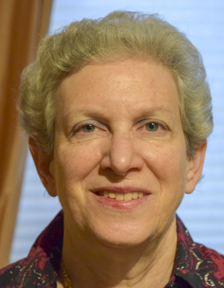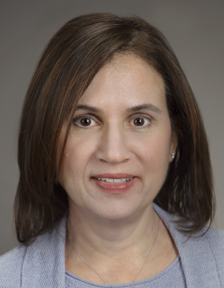Congenital Adrenal Hyperplasia Due to Steroid 21-hydroxylase Deficiency: An Endocrine Society Clinical Practice Guideline
Phyllis Witzel Speiser, MD
Cohen Children's Medical Center of New York, Northwell Health, Lake Success, NY
Dr. Phyllis Speiser is currently Chief of Pediatric Endocrinology at Cohen Children's Medical Center, Professor of Pediatrics at Zucker School of Medicine at Hofstra/Northwell and Associate Investigator at The Feinstein Institute for Medical Research. She has twice chaired The Endocrine Society's Task Force on Clinical Practice Guidelines for Congenital Adrenal Hyperplasia.
Mitchell E Geffner, MD
Children's Hospital Los Angeles, Los Angeles, CA
Mitchell E. Geffner, M.D. Dr. Geffner is Chief of the Division of Endocrinology, Diabetes, and Metabolism at Children's Hospital Los Angeles (CHLA), Professor of Pediatrics at the Keck School of Medicine of USC, and the Ron Burkle Chair in the Center for Endocrinology, Diabetes, and Metabolism. He graduated from the Albert Einstein College of Medicine (1975); was a house officer at LAC-USC Medical Center (1975-1979); and completed his fellowship in Pediatric Endocrinology at UCLA (1979-1982). His basic science research interest is in the general area of hormone resistance while, on the clinical side, he is involved in studies of new formulations, delivery systems, and indications for GH and GnRH therapy. Dr. Geffner is principal investigator at CHLA of the NIH-sponsored TODAY2 trial that is studying long-term outcomes of youth with T2DM and national consultant to the NIH-sponsored PHACS study of endocrinological/metabolic manifestations of HIV infection and its treatment in childhood. He is the author of over 150 peer-reviewed publications, 40 review articles, and 23 book chapters. He has served on the American Board of Pediatrics Sub-Board on Pediatric Endocrinology; as a Director, President (2014-15), and currently Secretary of the Pediatric Endocrine Society; and is an advisor to the MAGIC Foundation, the Pituitary Network Association, and CARES Foundation. Dr. Geffner is Associate Editor of the journal, Pediatric Endocrinology Reviews, pediatric endocrinology editor for UpToDate, and co-editor of the textbook, “Pediatric Practice: Endocrinology” (McGraw-Hill) (second edition published in 2014).
Richard J Auchus, MD, PhD
University of Michigan, Ann Arbor, MI
Richard J. Auchus, MD, PhD Brief Biography. Dr. Auchus is the James A. Shayman and Andrea S. Kevrick Professor of Translational Medicine in the Departments of Pharmacology and Internal Medicine in the Division of Metabolism, Endocrinology, and Diabetes at the University of Michigan. He also serves as Section Head of the Endocrinology Service at the Veterans Administration Ann Arbor Healthcare System. He received his S.B. in Chemistry from Massachusetts Institute of Technology and his medical degree and Ph.D. in Pharmacology from Washington University. He completed training in Internal Medicine at the University of Iowa Hospitals and Clinics and a fellowship in Endocrinology at the Wilford Hall USAF Hospital and the University of Texas Health Sciences Center in San Antonio. After postdoctoral work at the University of California, San Francisco, he joined the faculty at UT Southwestern in Dallas. He served as Acting Chief of the Divisions of Endocrinology and Translational Research at UT Southwestern before his relocation to Michigan in 2011, and he served as Program Director of the Endocrinology & Metabolism Fellowship from 2011-2018. Dr. Auchus and his group are active in research projects ranging from basic chemical principles of steroid biosynthetic enzymes and steroid mass spectrometry to clinical trials and translational investigation in disorders of the pituitary, adrenal, ovaries, and testes that cause hypertension, infertility, and obesity. His clinical interests also focus on pituitary, adrenal, and reproductive diseases that involve disorders of steroid production, and he is particularly interested in the care of adults with genetic disorders of steroid biosynthesis and action. He has authored over 260 journal articles and 30 book chapters, and he has lectured in a wide range of national and international conferences.
Deborah P Merke, MD, MS
National Institutes of Health, Bethesda, MD
Dr. Merke is Chief of the Pediatric Service at the National Institutes of Health Clinical Center in Bethesda,Maryland. As a Senior Investigator, her research has focused on studies of the pathophysiology and genetics of Congenital Adrenal Hyperplasia (CAH). Dr. Merke is currently conducting the largest ever Natural History Study of CAH, with over 450 patients enrolled. She was the first to identify adrenaline deficiency as a new hormonal imbalance in CAH and the first to report in CAH smaller-than-normal amygdala, the emotion regulator of the brain. Her group found that about 10 percent of patients with CAH due to 21-hydroxylase deficiency have a contiguous gene deletion syndrome affecting both the CYP21A2 (encoding the 21-hydroxylase enzyme) and TNXB (encoding tenascin-X, an extracellular matrix glycoprotein) genes resulting in a novel connective tissue dysplasia called CAH-X. Her group was the first to evaluate the potential clinical implications of TNXB mutation heterozygosity in a large cohort of patients with CAH. Central to her work is the study of new treatments, including a long-term trial testing sex hormone blockade in children, and novel ways of replacing cortisol, including the study of physiological cortisol replacement. Dr. Merke's studies of CAH provide insight into the clinical and genetic complexities of CAH and promise to improve patient outcome.
Walter L Miller, MD
University California, San Francisco, San Francisco, CA



